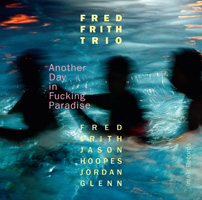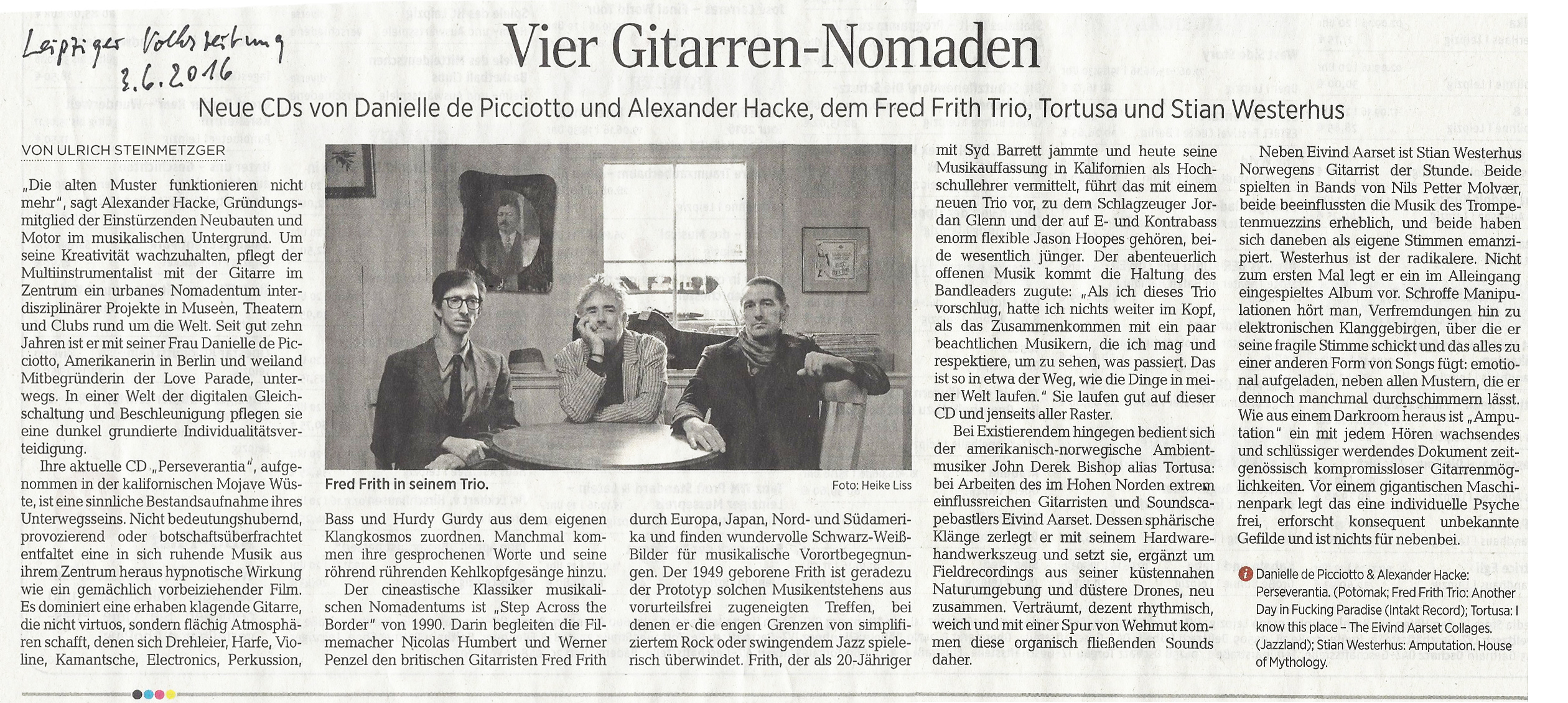
Ulrich Steinmetzger, Leipziger Volkszeitung, 3.6.2016
,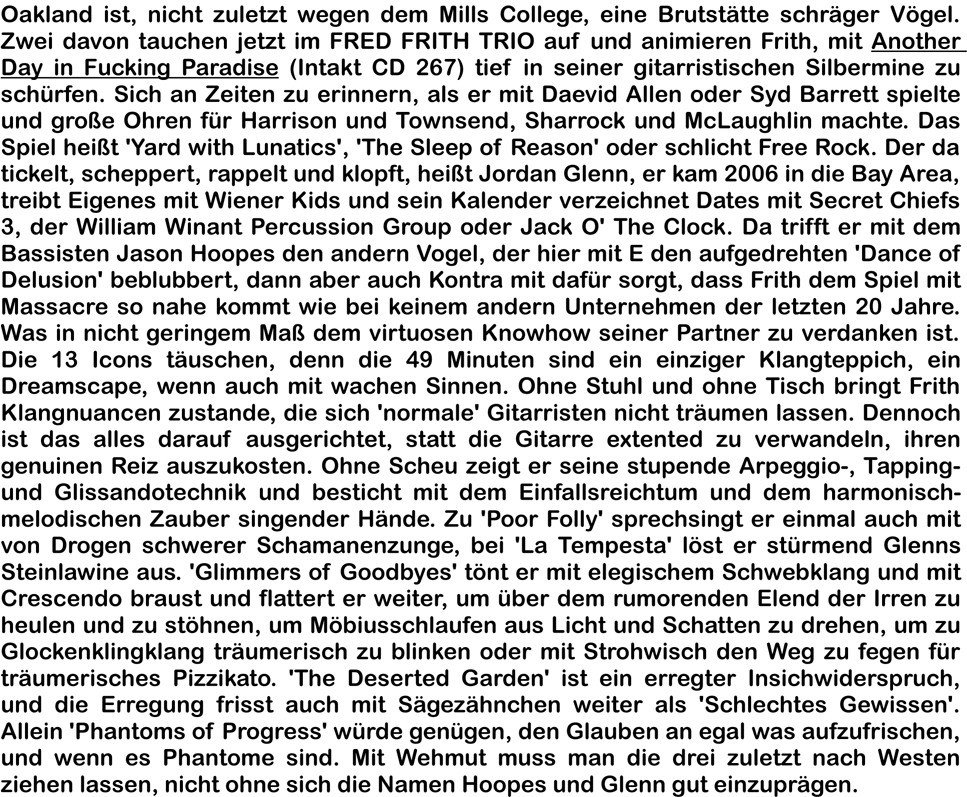
Rigobert Dittmann, Bad Alchemy, BA 90_2016

Pirmin Bossart, Kulturtipp, Zürich, 13-2016

Rolf Thomas, Jazzthetik, Deutschland, Juli 2016

Pirmin Bossart, Jazz'n'More, Juli 2016

Aldo Del Noce, Jazzconvention, 29 Luglio 2016
By way of a contrast to the hyper-detailed improv Frith concocts with MMM associates Alvin Curran, Joëlle Léandre, and Urs Leimgruber on Oakland/Lisboa, his own trio's Another Day in Fucking Paradise (Intakt) is a concentrated, time-stretched take on power trioism.
It's a 49 minute, 11 track studio album recorded in Oakland, in January 2016, with Frith in the company of electric bassist Jason Hoopes and drummer Jordan Glenn, both mainstays of the music scene around Frith's adopted home in the San Francisco Bay Area.
Frith describes the trio's MO as unpremeditated, saying that its musical themes emerged only after an intensive tour of Europe, during which: "I appeared to be channeling some of my earliest rock and roll experiences – jamming with members of Pink Fairies in 1969, a couple of sad weeks in a band with Syd Barrett." He goes on to tip practically every inventive guitarist of the era, from Macca to Sonny Sharrock, as influential.
With this trio, Frith says: "Anything can happen. Really. It's a bloody great feeling." Given Frith's ebullience, and the album's sassy title, its material cohesion and restraint may be unexpected. Don't fret though, there's plenty of Frith's complex, painterly and powerful fretwork.
From the tolling bells intro to "The Origin of Marvels", through the lead bass and Frith-stippled clattering percussion of "Dance of Delusion" and the leader's first liquid fire solo, to Frith's muttered vocal on the spaced-out proto-chant "Poor Folly", and the funked-up minimalist-industrial "La Tempesta", the album's opening moments slip and segue from one vibe to another, defying the ear to pin anything down.
Each piece segues into the next, so the album plays as a single piece with variegated movements.
The opening run slips into abstraction on "Glimmers of Goodbyes", with Frith casting an FX shimmer over a bass/drum workout reminiscent of Raoul Bjorkenheim's Scorch Trio, then coasts over a storm surge into "Yard with Lunatics" – at 11:31, the album's longest track by over 5 minutes.
That initial overspill soon dissipates into a floodplain with plenty of space for Frith to unspool long, layered sustains as a canvas for more gestural splashes of colour. With no way-markers for guidance, Hoopes and Glenn could sink into the alluvium, but they stay in touch and attuned, and the bassist takes up the melodic lead, before doubling up on contrabass to keep the pulse of the music alive.
"Only Light and Shadow" initially runs with the same vibe, with Frith amping up the effects and peeling off some taut lead lines. His partners are more restless, but their heightened tension slips into "The Sleep of Reason", and a zone of lulling bell-chimes. This is the closest the trio come to Frith's electro-acoustic project Death Ambient.
Hoopes' Contrabass is a steady, luminous presence amid percussive agitation and raw electrical noise on "Straw Men", but "The Deserted Garden" and "Schlechtes Gewissen" bring late flowerings of turbulence and friction, with Frith floating lovely, Fripp-esque tones to sweeten the former, then synthesising variegated tones of friable volatility to accompany sweaty bowed bass and taut frame drumming.
As the multi-tracked guitar impro-prog of "Phantoms of Progress" slowly dissolves into washes of guitar synth the trio's pulse seems to weaken, but it's just a feint: outro "The Ride Home" is bass-sprung and whisked briskly along by Glenn's brushed snare, with Frith free, as ever, to conjure his extraordinary richly-textured and multi-layered guitar parts.
Tim Owen, Dalston Sound, London, August 11, 2016
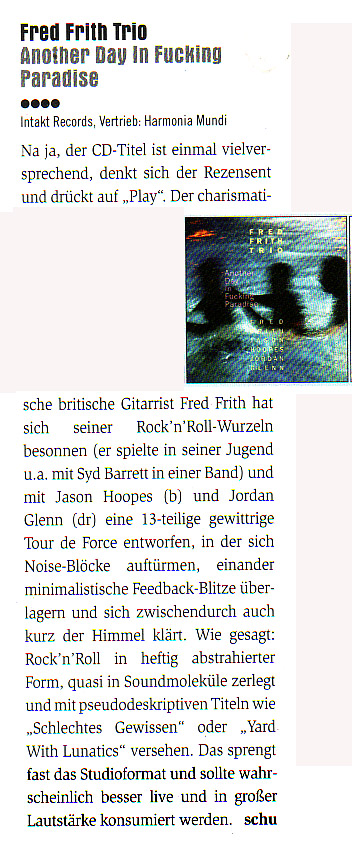
Martin Schuster, Concerto, Österreich, 4-16

Andy Robson, Jazzwise, London, September 2016
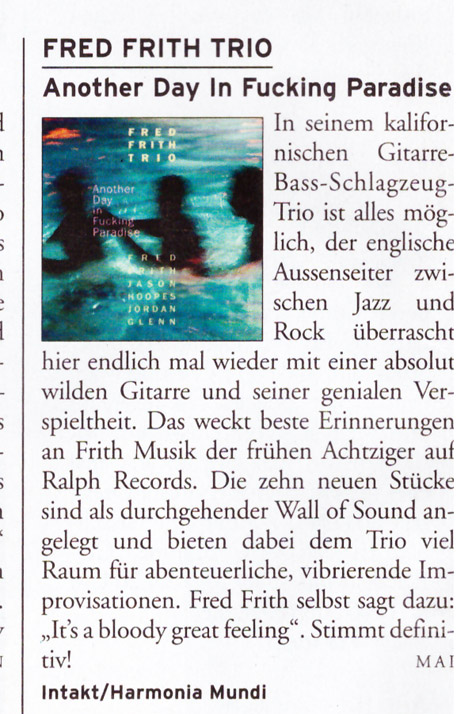
Olaf Maikopf, Schädelspalter. Hannovers Stadtillustrierte. September 2016
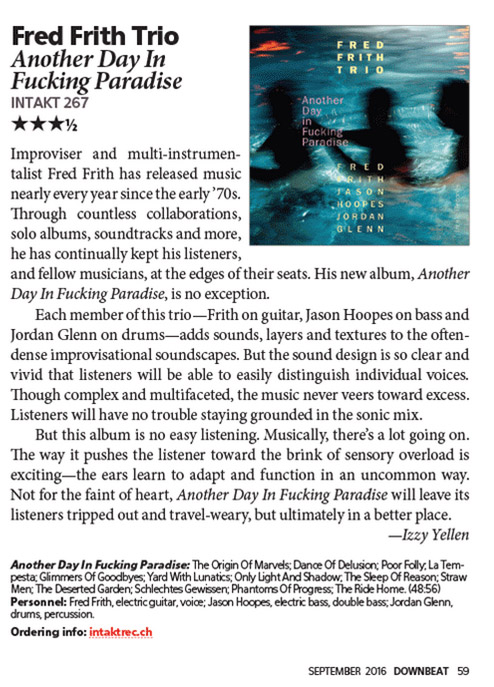
Izzy Yellen, Downbeat, September 2016

Glenn Astarita, All About Jazz, September 6, 2016
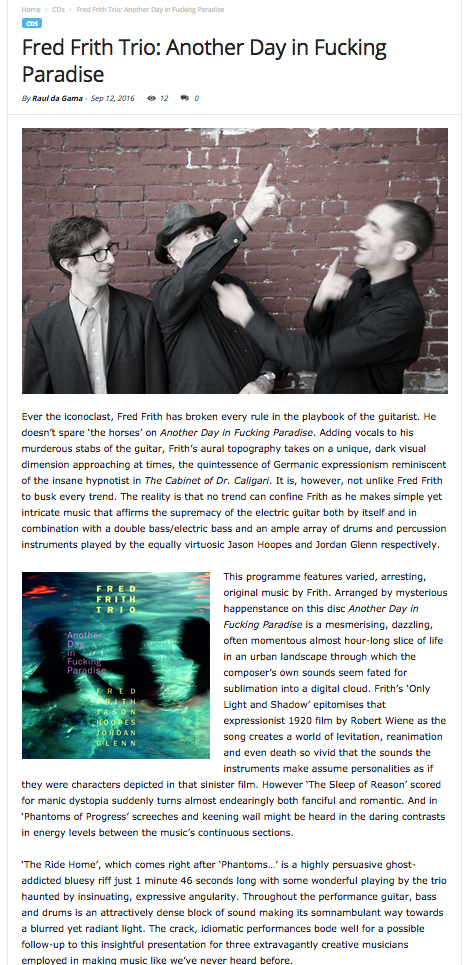
Raul da Gama, Jazzdagama, Sept. 12, 2016
Produkcje Freda Fritha są dla mnie zawsze interesującym przeżyciem, choć w zasadzie nie wiem dlaczego. Nie mam problemu, żeby przyznać się sam przed sobą, że części z nich zwyczajnie nie rozumiem. Poza tym Fred Frith jest dość intensywnie nagrywającym artystą, więc nie daję rady śledzić chronologii jego nagrań i próbować wyrobić sobie własnego zdania na temat muzycznego rozwoju jego niezwykłego, tu nie mam wątpliwości, talentu. Kiedy w muzyce nie ma czytelnej i chwytliwej melodii, odrobiny bluesa i miejsca na dopisanie tekstu, który dałoby się zaśpiewać, zaczyna ona stanowić wyzwanie intelektualne i staje się dużo trudniejsza do opisania.
Są jednak takie nagrania, do których wracam dość często, mimo faktu, że właściwie nie potrafię wytłumaczyć dlaczego. Melodii nie da się przecież zanucić, przeboju z tego nie będzie, ani jazzowego standardu, po który sięgną inni muzycy.
Tak będzie pewnie w przypadku albumu "Another Day In Fucking Paradise", jednej z najnowszych produkcji Freda Fritha wydanej przez szwajcarską oficynę wydawniczą Intakt. Album został wydany całkiem niedawno, bowiem wedle opisu na okładce jego mix odbył się w marcu 2016 roku. Pewności jednak, czy to najnowszy album z udziałem Freda Fritha nie ma w zasadzie nigdy, bowiem wydaje on swoją muzykę w wielu różnych wydawnictwach, uczestnicząc dodatkowo w roli sidemana w przeróżnych muzycznych przedsięwzięciach, które doprawdy nie jest łatwo zliczyć. Datę 2016 nosi jeszcze co najmniej jedno wydawnictwo Freda Fritha – tym razem wydane w Portugalii przez Clean Feed wspólnie nagrane z Darrenem Johnsonem, ale o tym kiedy indziej.
Album "Another Day In Fucking Paradise" powstał jako dzieło zbiorowej improwizacji Freda Fritha, basisty Jasona Hoopesa i perkusisty Jordana Glenna. Członkowie zespołu Freda Fritha to muzycy o pokolenie młodsi od lidera, choć z długą listą muzycznych eksperymentów i nagrań na koncie. Z pewnością jednak to współpraca z Fredem Frithem jest ich największym w sensie komercyjnym muzycznym dokonaniem. Choć w przypadku Freda Fritha o komercji nie może być oczywiście mowy.
Sam lider powołuje się opisując muzyczną akcję, którą słychać na płycie "Another Day In Fucking Paradise" na inspiracje twórczością zespołów Pink Floyd i Gong, wspomina swoją współpracę z Sidem Barrettem, a także wymienia takich muzyków, jak Muddy Watters, Sonny Sharrock i Georg Harrison, pozostawiając wyróżnione miejsce specjalne na dokonania Johna McLaughlina w zespole Lifetime Tony Williamsa.
Już kiedy posłuchałem po raz pierwszy tego albumu, przeczytałem ów wstępniak i postanowiłem odnaleźć te inspiracje w zawartej na krążku muzyce. Z pewnością jest tu więcej Lifetime niż Muddy Watersa, ale moim zdaniem jest tu równie dużo Bacha i Stockhausena. Albo dowolnego innego kompozytowa.
Wśród instrumentów perkusyjnych pojawiają się egzotycznie brzmiące gongi, więc inspiracje japońską lub malajską muzyką ludową też dałoby się do tego albumu dopisać. Po kilku wieczorach spędzonych z tym albumem i dłuższych rozmyślaniach doszedłem do wniosku, że może znam innego Muddy Watersa niż Fred Frith. Kolejny wieczór spędziłem zatem wśród dźwięków Muddy Watersa i wczesnego Pink Floyd, żeby spróbować to wszystko sobie poukładać.
Nie potrafię, ale Fred Frith swój cel osiągnął. W moim przypadku może w zupełnie niezamierzony sposób, bowiem jego album stał się dla mnie rodzajem intelektualnej zagadki. Jednak celem muzyka jest dotrzeć ze swoją muzyką do słuchaczy. Do mnie dotarł. Pewnie za jakiś czas do albumu wrócę, żeby sprawdzić, gdzie tam jest Muddy Waters i John McLaughlin.
Moim zdaniem warto się z tym tematem zmierzyć. "Another Day In Fucking Paradise" to jeden z takich albumów, w którym każdy usłyszy coś innego. Ja usłyszałem intelektualną zagadkę. Moim zdaniem warto sprawdzić, co usłyszycie…
Rafał Garszczyński, RadioJAZZ.FM poleca! Poland, 13 czerwiec 2016
Jean Buzelin. Disques, livres & Co » Chroniques 2016. 14 Octobre 2016
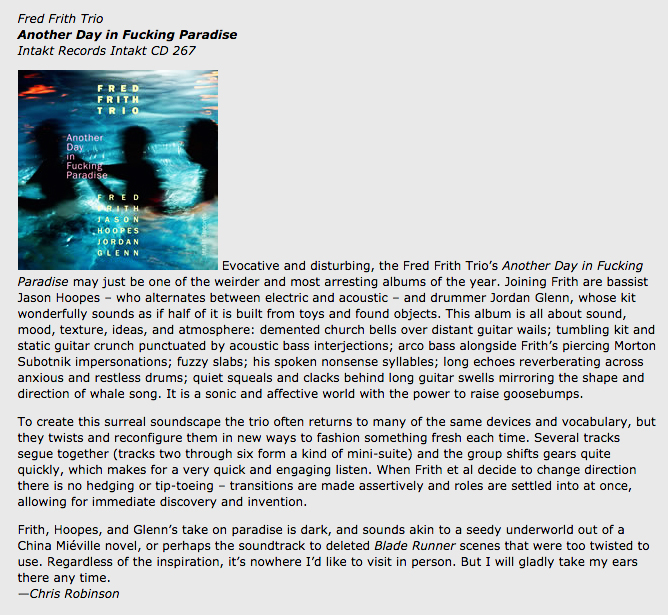
Chris Robinson, Point of Depurture 56, USA, 2016
Le rock manque-t-il à Fred Frith ? A lire le titre bien bien punk de son nouveau disque, on se demande... Rappel rapide de la biographie du (essentiellement) guitariste : membre fondateur du groupe de rock-prog anglais Henry Cow qui hissa la chaussette au rang d'oeuvre totale sur ses couvertures d'album, Fred Frith dérive après les années 70 et la rupture du band vers des scènes encore plus improvisées, encore plus underground, encore plus radicales. D'où sa présence continue depuis un tas de berges sur Intakt, label qui sait héberger tous ces itinéraires mal dégrossis pour l'industrie, sachant faire du bien pour le reste : d'ailleurs, Barry Guy viendrait lui plutôt de la musique baroque, c'est dire.
Mais en fait, le rock manque sans doute à Fred Frith. Son power trio bien à lui (Jason Hoopes aux basses, Jordan Glenn aux percussions et batterie) s'empare d'une musique qui emprunte beaucoup à un vocabulaire croisant quelque part entre Pink Floyd (avec qui a joué Fred Frith, avant qu'ils ne le deviennent) et Sonny Sharrock, un travail sur les textures et le son qui donne envie de passer un coup de bigot à Jim Jarmusch pour qu'il tourne Dead Man 2, Frith remplace Neil Young. Tout cela mélangé avec l'intérêt radical et toujours aussi intransigeant du guitariste anglais pour les musiques non-idiomatiques, par le biais desquels il insère des déséquilibres aux potentialités lyriques (''Yard with Lunatics''), énergiques (''The Deserted Garden'', presque électro dans l'usage du schred), spectrales, infinies quoi !
Une impression de boucle bouclée se dégage de cet album lorsqu'on s'est un brin penché sur la carrière de Frith, mais une boucle ouverte sur quelque chose comme de la musique. Une spirale, si vous voulez. Comme souvent avec les albums de Fred Frith, la vie intérieure de l'album est parfois trop laissée à sa propre économie (je me comprends) et lasse par endroits, retenant essentiellement les manies et le figement dans l'ensemble de ce que ces musiques ''improvisées'' peuvent offrir. Pour le reste, des vrais bijoux bijoux, de vrais morceaux d'absolu kiff, et l'intransigeance d'une musique qui en toute simplicité reste fidèle à son salutaire mouvement.
Pierre Tenne, Djam, France, 2016

John Pietaro, New York City Jazz Record, December 2016
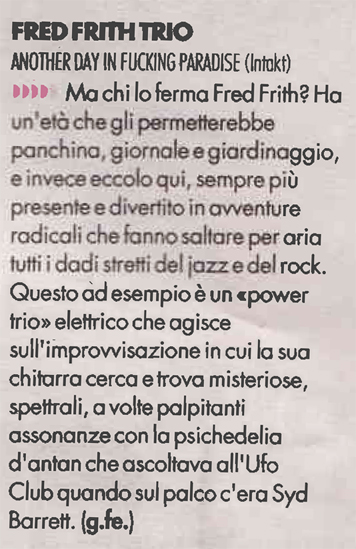
Guido Festinese, Il Manifesto, 7. Gennaio 2017
Ayumi Kagitani, Way Out West 97, Japan, April 2017

Alessandro Manitto, Musica Jazz, 16/01/2019
|
